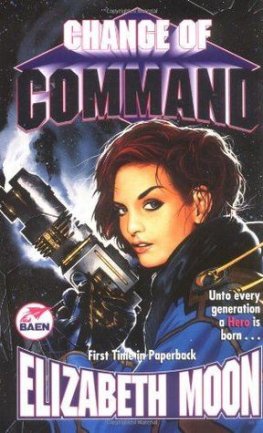Elizabeth Moon - Against the Odds
Here you can read online Elizabeth Moon - Against the Odds full text of the book (entire story) in english for free. Download pdf and epub, get meaning, cover and reviews about this ebook. genre: Science fiction. Description of the work, (preface) as well as reviews are available. Best literature library LitArk.com created for fans of good reading and offers a wide selection of genres:
Romance novel
Science fiction
Adventure
Detective
Science
History
Home and family
Prose
Art
Politics
Computer
Non-fiction
Religion
Business
Children
Humor
Choose a favorite category and find really read worthwhile books. Enjoy immersion in the world of imagination, feel the emotions of the characters or learn something new for yourself, make an fascinating discovery.
- Book:Against the Odds
- Author:
- Genre:
- Rating:5 / 5
- Favourites:Add to favourites
- Your mark:
- 100
- 1
- 2
- 3
- 4
- 5
Against the Odds: summary, description and annotation
We offer to read an annotation, description, summary or preface (depends on what the author of the book "Against the Odds" wrote himself). If you haven't found the necessary information about the book — write in the comments, we will try to find it.
Against the Odds — read online for free the complete book (whole text) full work
Below is the text of the book, divided by pages. System saving the place of the last page read, allows you to conveniently read the book "Against the Odds" online for free, without having to search again every time where you left off. Put a bookmark, and you can go to the page where you finished reading at any time.
Font size:
Interval:
Bookmark:
Elizabeth Moon
Against the Odds
For Kathleen and David
Non omnis moriar
Acknowledgements
As usual, I have many people to thank for help, including some who prefer not to be listed; you know who you are, and you know I appreciate it. David Watson and Kathleen Jones, for hours of brainstorming and for their collection of useful references, but most of all for wanting the story so badly that they restored my ability to tell it. The weekly fencing crowd (Allen, Andrew, Beth, Connor, Sean, Susan, Tony, Brian, etc.) for varied expertise that included such things as damage control on an aircraft carrier and the characteristics of large cables under tension, an evening of editorial comment, and especially for allowing me to work off my tension by poking them with swords. Clive Smith and Christine Joannidi for bits of physics, the history of an Anglo/Greek trading family, and the best Yorkshire pudding in central Texas. Those who hang out in my SFFnet newsgroup and provide facts, ideas, and general support (in this case, a double dose of thanks to Cecil, Howard, Julia, Rachel, Tom, and Susan.) Carrie Richerson for her ability to detect mushy spots in characterization. My husband Richard for the worst pun in the book. Our son Michael for patience with a writing parent. Michael Fossel, M.D., Ph.D., for stimulating discussions of rejuvenation. Ruta Duhon for weekly doses of sanity even when writing gets wild.
Mistakes and errors are all mine, not theirs.
Note to Readers
Readers familiar with Change of Command will notice a temporal overlap between the last part of that book, and the first part of this one. Here the first chapter starts between the mutiny and the second assassination.
Newcomers may wish a bit more background.
The Familias Regnant is a political assembly of great families, now spread across hundreds of solar systems. Centuries ago, they combined their individual family militias into the Regular Space Service, which has the dual mission of policing the spaceways and defending the Familias from external attack.
In the previous book, Change of Command, longstanding dissension and unrest in the R.S.S. came to a head and elements of the Fleet mutinied.
The mutineers first struck at the Fleet training planet, Copper Mountain, freeing some of the prisoners from a high-security brig on a remote island. The rest they massacred. Their original plan had included taking over a weapons research facility, but loyalists managed to prevent that, at least for the moment. Unfortunately, the mutineers managed to destroy their transportation: the loyalists are marooned.
Chapter One
A cold wind swept the barren top of Stack Two; Ensign Margiu Pardalts eyes ached from squinting into it. Broad daylight now; the wind had long since swept away the bitter stench of the seaplane fires. Where were the mutineers? Surely they would land, to snatch the weapons they knew had been designed here. Had the message shed tried to send using the old technology actually reached anyone, or would the mutineers get away with their whole plan? And when would they come . . . when would they come to kill her?
This is stupid, Professor Gustaf Aidersson said. Bundled in his yellow leather jacket over his Personal Protective Unit, with a peculiar gray furry hat on his head, he looked more like a tubby vagrant than a brilliant scientist. When I was a boy, I used to imagine things like this, being marooned on an island and having to figure out a way to get home. I had thousands of plans, each one crazier than the one before. Make a boat out of my grandmothers porch swing, make an airplane out of the solar collector, take the juicer and a skein of yarn, two cups, and a knitting needle and make a communications device.
Margiu wondered whether to say anything; she couldnt feel her ears anymore.
So here we are, on the perfect island, full of challenges. I should be improvising rappelling gear to go down the cliffs, and something to construct a sailboat . . . I actually have built a boat, you know, but it was with wood from a lumberyard. And I sailed it, and it didnt sink. Of course, it wouldnt hold all of us.
Sir, Margiu said, dont you think we should go back inside?
Probably. He didnt move. And there is not one thing on this blasted island to make a boat or an airplane out of. He gave a last look at the blackened stain that had been their transport. Then he looked at Margiu and his mouth quirked in a mischievous grin. Theres only one thing to do, when the bad guys have all the transport . . .
Sir?
Make them give it to us, he said, and headed inside so abruptly that Margiu was left behind. She caught up with him as he went in the door.
Make them?
Its a desperate chance . . . but by God itll be fun if it works, he said. He looked around the room at the scientists and military personnel who were also stranded. ListenI have an idea!
You always have an idea, Gussie, one of the scientists said. Margiu still hadnt sorted them all out by name. They all looked tired and grumpy. You probably want us to make an airplane out of bedsprings or something . . .
No. I thought of that, but we dont have enough bedsprings. I want the mutineers to bring us an airplane and give it to us.
What?
The professor launched into an enthusiastic explanation. In the few seconds from outside to inside, his idea had already developed elaborate additions. The others looked blank.
Major Garson was the first to nod. Yeahthe only way to get transport is to get them to give it to us. But its not going to be easy. Theyve got a lot more troops topside than we have . . . they can scorch us with the shuttle weaponry, for that matter.
So our first job is to convince them were not that dangerous, the professor said. He had taken off his hat and shoved it into a pocket; his thinning gray fringe stuck up in untidy peaks.
Do they even know how many of us there were? asked Margiu. They dont know the planes were full, do they? Vinet didnt get any messages up to them
No . . . thats right. And except during the firefight last night, weve been mostly undercover. But theyd be stupid to come in carelessly, Major Garson said. Never count on the enemy to be careless.
But The professor held up his hand a moment, then nodded. But suppose, using Margius radio apparatus, we give them what looks like accidental clues. We try to contact them, pretending to be mutineers fighting with scientists
No, wait! That was the skinny man with wild black hair. Ty, Margiu remembered. Look, they know the loyalists have the radio now. Suppose we send a message, like we hope itll bounce around to mainland, begging for help. And then break off. And then an hour or so later, theres a message to them from some of the military pretending to be mutineers, and then
How would the mutineers know how to use that equipment? Garson said. Its nothing Fleet-trained people would know unless they happened on it somewhere else, like Ensign Pardalt. And besides, its too fragile. It could get shot up in a firefight.
Suppose we say the radios the loyalists, Margiu said. The others looked at her. And were begging for help from the mainland, like he said. She nodded at Ty. But of course it doesnt come. We sound more and more desperatewe talk about being hunted by the mutineers, about the people killed in the explosions of the planes, and then the food shortagesthe mutineers have all the supplies . . .
Yes! Thats good, the professor said. And well move the thing around, so when they trace the signal theyll know someones trying to stay in hidingand then well take it underground . . .
Well need a visible force of baddies, the major said. A squadll do for that. Local uniforms . . . and PPUs can look like anything, with the right setting. Weve got the suitcoms for localhave to have our people stay in character.
Font size:
Interval:
Bookmark:
Similar books «Against the Odds»
Look at similar books to Against the Odds. We have selected literature similar in name and meaning in the hope of providing readers with more options to find new, interesting, not yet read works.
Discussion, reviews of the book Against the Odds and just readers' own opinions. Leave your comments, write what you think about the work, its meaning or the main characters. Specify what exactly you liked and what you didn't like, and why you think so.












